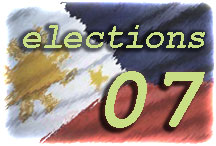 As a mock election for
senators is set in Hong Kong, Filipino groups there fear a lower turnout
of voters compared to the 2004 elections, resulting in the
disenfranchisement of about 70 percent of overseas Filipino workers (OFWs)
in that country.
As a mock election for
senators is set in Hong Kong, Filipino groups there fear a lower turnout
of voters compared to the 2004 elections, resulting in the
disenfranchisement of about 70 percent of overseas Filipino workers (OFWs)
in that country.
BY AUBREY SC MAKILAN
Bulatlat
As a mock election
for senators is set in Hong Kong, Filipino groups there fear a lower
turnout of voters compared to the 2004 elections, resulting in the
disenfranchisement of about 70 percent of overseas Filipino workers (OFWs)
in that country.
HK OFW voters
The Hong Kong chapter
of the Gabriela Women’s Party (GWP-HK) said that there is a high
probability of a “low turnout of voters.”
GWP-HK Chairperson
Cynthia Ca Abdon-Tellez said, “Disempowerment and disenfranchisement of
OFWs” is allegedly due to the failure of government to fully implement the
Overseas Absentee Voting (OAV).
In the 2004
elections, 64,040 or 71 percent of the 89,903 registered voters actually
voted, according to GWP-HK. Data from the Commission on Elections (Comelec)
show that 88,001 Hong Kong-based Filipino migrants were registered as of
April 27, 2004, making them the most overseas registrants in the coming
polls.
According to the
Commission on Filipinos Overseas, there were 196,941 temporary and
irregular overseas Filipinos in Hong Kong in December 2004. This means
that only 32.52 percent of Hong Kong-based OFWs actually voted in May
2004, resulting in the disenfranchisement of the remaining 67.48 percent.
Incidentally, there
are about 120,000 OFWs in Hong Kong working as foreign domestic helpers (FDH),
according to the United Filipinos in Hong Kong (Unifil-HK).
This year, Tellez said that even the Philippine Consulate General in Hong
Kong (PCG-HK) allegedly admitted an expected lower turnout of voters. “How
can we expect any improvement if government is the one instituting the
limitations of the OAV with the insufficient, and in some cases, nil,
information and education drive among OFWs as well as the insufficient
human and logistical machinery for registration and actual voting?”
Telez added that only
22 precincts will be established by the PCG-HK for the month-long voting
period, a far cry from the more than 40 precincts set up and several
satellite registrations conducted during the 2004 elections. She said that
the limited number of precincts “can surely discourage many from voting
due to the prospect of using their day-off just to vote.”
According to Tellez, though OAV will run for a month, Filipino domestic
helpers will only have four days for the actual voting set to be held in a
center several kilometers away from the Central where thousands of
Filipinos go on their day-off.
GWP-HK also reported that the government allegedly lacks efforts for
information dissemination and education work in line with the May 14
elections. Problems such as these, Tellez said, were already raised in the
2004 elections and in fact, contained in the official Commission on
Elections (Comelec) report.
Mock election
Meanwhile, a week
before OAV begins, a Filipino alliance of domestic workers will conduct a
mock election to gauge the sentiments of OFWs on the senatorial
candidates.
Eman Villanueva, Unifil-HK secretary-general and organizer of the
activity, said the mock election “shall give an insight on how Filipino
overseas will likely vote come election time.”
The activity, an initiative of Migrante International, will be an
internationally-coordinated effort. In Hong Kong, the mock election will
be on April 8, 10 a.m. to 5 p.m., at Chater Road where at least 1,000 Hong
Kong-based Filipino voters are expected to participate.
Villanueva said that they are hoping that the senatorial candidates will
address issues confronting migrant workers like the new Philippine
Overseas Employment Administration guidelines, government fees, lack of
services and protection and the alleged anomalies at the Overseas Workers
Welfare Administration (Owwa). “We challenge the candidates to prove their
worth to the OFWs who have long been denied our rightful say on policies
and laws that impact on us and our families.”
Migrant empowerment
“While OFWs celebrate the victory of finally being able to participate in
the elections through the OAV, the government’s blunders and failure to
implement the law are the biggest stumbling blocks for its full
realization,” said Tellez.
Because of this, she said that the “empowerment of migrant workers remains
a distant dream and is just government propaganda.”
But with OFWs
“aggressively” telling their families to assess the candidates’ stand on
OFW issues when they vote on May 14, Villanueva said that these shall have
a significant impact on the electoral process. “The election is an arena
where we can raise our concerns and we shall surely use the upcoming polls
to choose candidates who, by record and by platform, shall advance the
interests of OFWs and our families.”
In the 2004
elections, OFW groups formed Migrante Sectoral Party (MSP) that is
supposed to represent migrant workers in the House of Representatives.
However, MSP only got 110,507 or 0.87 percent of total votes cast in the
party-list election, short of the required two-percent requirement for one
seat. In the coming May elections, GWP has as its third nominee Flora
Belinan who comes from the migrant sector. Bulatlat
BACK TO
TOP ■
PRINTER-FRIENDLY VERSION ■
COMMENT
© 2007 Bulatlat
■
Alipato Publications
Permission is granted to reprint or redistribute this article, provided
its author/s and Bulatlat are properly credited and notified.